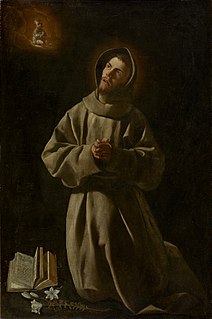
The Franciscans are a group of related mendicant religious orders within the Catholic Church, founded in 1209 by Saint Francis of Assisi. These orders include the Order of Friars Minor, the Order of Saint Clare, and the Third Order of Saint Francis. They adhere to the teachings and spiritual disciplines of the founder and of his main associates and followers, such as Clare of Assisi, Anthony of Padua, and Elizabeth of Hungary, among many others.

The Pontifical Gregorian University is a higher education ecclesiastical school located in Rome, Italy. It was originally a part of the Roman College founded in 1551 by Ignatius of Loyola, and included all grades of schooling. The university division of philosophy and theology of the Roman College was given Papal approval in 1556, making it the first university founded by the Society of Jesus (Jesuits). In 1584 the Roman College was given a grandiose new home by Pope Gregory XIII, after whom it was renamed. It was already making its mark not only in sacred but also in natural science.

Catholic higher education includes universities, colleges, and other institutions of higher education privately run by the Catholic Church, typically by religious institutes. Those tied to the Holy See are specifically called pontifical universities.
Pontifical universities are higher education ecclesiastical schools established or approved directly by the Holy See, composed of three main ecclesiastical faculties and at least one other faculty. These academic institutes deal specifically with the Christian revelation and related disciplines, and the Church's mission of spreading the Gospel, as proclaimed in the Apostolic Constitution both "Sapientiachristiana". Many of them, on the other hand, have most of their students studying secular topics. They are governed by the apostolic constitution Veritatis gaudium issued by Pope Francis.

The Servite Order is one of the five original Catholic mendicant orders. Its objectives are the sanctification of its members, preaching the Gospel, and the propagation of devotion to the Mother of God, with special reference to her sorrows. The members of the Order use O.S.M. as their post-nominal letters. The male members are known as Servite Friars or Servants of Mary.
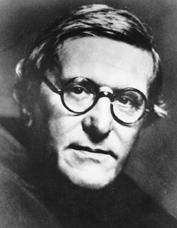
Agostino Gemelli, O.F.M., was an Italian Franciscan friar, physician and psychologist, who was also the founder and first Rector of Università Cattolica del Sacro Cuore of Milan.

The Pontifical Catholic University of Argentina, whose full name in Spanish is Pontificia Universidad Católica Argentina "Santa María de los Buenos Aires", also known as Universidad Católica Argentina (UCA), is a university in Argentina with campuses in the cities of Buenos Aires, Santa Fe, Rosario, Paraná, Mendoza and Pergamino. The main campus is located in Puerto Madero, one of the most modern neighborhoods of Buenos Aires.

The Pontifical Urban University, also called the Urbaniana after its names in both Latin and Italian, is a pontifical university under the authority of the Congregation for the Evangelization of Peoples. The university's mission is to train priests, religious brothers and sisters, and lay people for service as missionaries. Its campus is located on the Janiculum Hill in Rome, on extraterritorial property of the Holy See.
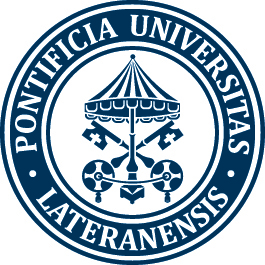
The Pontifical Lateran University, also sometimes referred to as the Pontifical University of Apollinaire, is a university by pontifical right based in Rome. The university also hosts the central session of the Pontifical John Paul II Institute for Studies on Marriage and Family. The university is known as "The Pope's University". Its Grand Chancellor is the Vicar General to the Holy Father for the Diocese of Rome. Four of its graduates have been canonized. As of 2014 the Pontifical Lateran university had students from more than a hundred countries.

Colin Francis MacKinnon was a Canadian Roman Catholic Archbishop and founder of St. Francis Xavier University and Saint Ninian's Cathedral.

Diomede Angelo Raffaele Gennaro Falconio, OFM was an Italian Cardinal of the Catholic Church. He served as Prefect of the Congregation for Religious from 1916 until his death, and was elevated to the cardinalate in 1911. He was Apostolic Delegate to the United States from 1902 to 1911.

The Superior Institute of Religious Sciences of St. Thomas Aquinas is an institution of higher education in Kiev (Ukraine), conducted by the Dominican Friars of the Vicariate General of Russia and Ukraine and, affiliated to the Pontifical University of St. Thomas Aquinas (Angelicum).
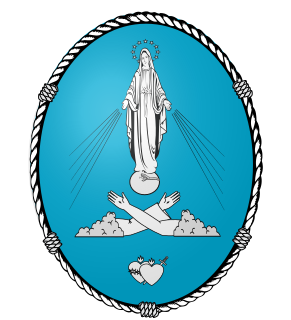
The Franciscan Friars of the Immaculate is a Roman Catholic institute of consecrated life with Pontifical Right established by Pope John Paul II on 1 January 1998. The F.F.I. was founded by two Franciscan Conventual priests on 2 August 1970 and is a reformed Franciscan Conventual religious institute living the Regula Bullata of Saint Francis of Assisi according to the Traccia Mariana.

A pontifical university is a Catholic university established by and directly under the authority of the Holy See. It is licensed to grant academic degrees in sacred faculties, the most important of which are Sacred Theology, Canon Law, Sacred Scripture and Philosophy. Pontifical universities follow a European system of degrees in the sacred faculties, granting the baccalaureate, the licentiate, and the doctorate.
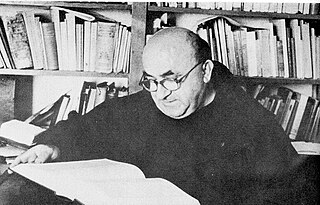
The Pontifical Academy of Mary is an international pontifical organization tasked with promoting mariology. The academy is one of the Pontifical academies at the Vatican in Rome. The PAMI also has the task of coordinating the other Marian academies and societies that exist worldwide and of exercising vigilance against any Marian excess or minimalism. For this purpose the Pope directed that the Academy have a council that examines the organization of congresses, and that coordinates Mariological societies and those who promote or teach mariology.
The Pontifical Faculty of Theology of Sardinia is a theological academic institution founded by pope Pius XI in Cuglieri with the Apostolic Constitution Nostrarum Partem of 5 August 1927. It was the first Italian Faculty of Theology extra urbem.

The Pontifical University of St. Bonaventure or Pontifical Theological Faculty of Saint Bonaventure, commonly called the Seraphicum, is the international study center of the Friars Minor Conventual in Rome. As a Pontifical faculty, the Seraphicum is governed by the Holy See according to the Apostolic Constitution Sapientia christiana.

Charles Balic was a Croatian Franciscan Mariologist. Friar Charles Balić was a famous Theologian, specializing in the figure and works of John Duns Scotus, and Rector of the Pontifical University Antonianum of Rome. He was the founder of the Pontifical Academy of Mary and President of the International Scotistic Commission. He was the principal redactor in the editing of the chapter VIII of the Lumen gentium with "De Beata" redaction. He has been important for the ecumenical mariology. Balic is considered as one of the top representative of the "Marian movement" in the 20th century: his appointment was conclusive for the proclamation of the dogma of the assumption.

Via Merulana is a street in the Rione Monti of Rome, Italy. It is south of the main train station of Rome, near the Oppian Hill. The street connects two major papal basilicas: the Santa Maria Maggiore to the St John Lateran. The name derives from family that owned the land during the medieval period. The present street was initiated by Pope Gregory XIII in the late 16th century and finished not long after by Pope Sixtus V.
Mary Melone, S.F.A. is an Italian Franciscan religious sister and theologian specialising in the life and thought of Saint Anthony of Padua. Since October 2014, she has served as the Rector of the Pontifical University Antonianum in Rome. She was the first woman to head a pontifical university.



